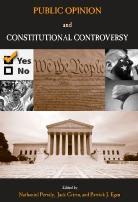Persily Book Measures High Court's Impact on Public Opinion
Persily Book Measures High Court's Impact on Public Opinion
NEW BOOK MEASURES SUPREME COURT’S IMPACT ON U.S. PUBLIC OPINION
From Abortion to School Prayer, Gay Rights to the War On Terror
Press contact:
James O’Neill 212-854-1584 Cell: 646-596-2935
March 11, 2008 (NEW YORK) – Key U.S. Supreme Court rulings routinely generate major newspaper headlines and a flurry of chatter on TV and radio. Despite that, decisions by the nation’s highest court have far less influence on what Americans think about the hot button issues of the day than one might expect.
Columbia Law School professor Nathaniel Persily has co-edited a new book, Public Opinion and Constitutional Controversy, which takes an innovative approach to measuring how greatly U.S. Supreme Court decisions mold American public opinion. Editors Persily, Jack Citrin and Patrick J. Egan have brought together an impressive array of political scientists and law professors, who analyze 50 years of polling data to show how much court decisions change or affect public opinion on a wide array of the issues that have defined the culture wars of the past several decades.
Such hot button issues as desegregation, school prayer, abortion, the death penalty, gender equality, affirmative action, flag burning, gay rights, the right to die and the war on terror and its impact on civil liberties are covered in Public Opinion and Constitutional Controversy, published by Oxford University Press.
“This is the only book that actually puts American public opinion on all the major constitutional controversies together in one place,” said Persily, an expert on constitutional law, the Supreme Court, election law and American politics.
To set up an interview with Persily, contact Jim O’Neill at 212-854-2514 or [email protected]. Live and taped TV interviews can be arranged using Columbia Law School’s on-campus TV studio.
Reviewers and journalists who would like a review copy of Public Opinion and Constitutional Controversy should contact Catherine Hui, marketing manager for Oxford University Press, at 212-726-6190 or [email protected].
Persily (left) said that while the general perception might be that Supreme Court decisions either cause controversy, with Roe v. Wade being a prime example, or lead to change in public opinion, as was the case with Brown v. Board of Education, in fact most Supreme Court decisions have neither result.
“For the most part the Supreme Court decisions have no effect on public opinion,” Persily said.
Still, Public Opinion and Constitutional Controversy shows that a small number of cases can have significant impact on public opinion, and in a variety of ways. As Persily writes in the book’s introduction, “The most polarizing controversies of today’s politics often find a home in the courtroom as well as in the legislative chamber or candidate debate.”
Some decisions, such as Roe v. Wade, polarize by setting two extreme sides off into a public battle. Some decisions set off a public backlash, such as the Court’s 2003 decision in Lawrence v. Texas, which struck down a Texas state law banning consensual sex between gay adults and led to an intense national debate over gay marriage.
And some cases can cause an initial backlash, as Brown v. Board of Education did in the South, but can also lead to general change in attitudes and public opinion over time. “The same court decision might lead to a short-term backlash, medium-term polarization, and long-term legitimation. We recognize that the effect of a court decision,” Persily writes in the book’s introduction, “may be felt more over the long term than in the few years following the decision.”
The book grew out of the authors’ examination of the public opinion backlash in the wake of Lawrence and the Massachusetts high court’s invalidation of that state’s ban on same sex marriage. Persily said he and his co-authors wanted to compare that reaction to the public response in other high profile culture war cases, but that no volume compiled the relevant public opinion data.
They pulled polling data from the Roper Center for Public Opinion Research, the Pew Research Center, the General Social Survey, Gallup polling data, polls by news organizations, and the American National Election Studies.
Public Opinion and Constitutional Controversy has two potential audiences, Persily said – not only those who study the Supreme Court but also those interested to know what Americans think about the issues that have marked the front lines of the culture wars.
About the book’s editors:
Nathaniel Persily, Professor of Law at Columbia Law School, is an expert on voting rights, election law, constitutional law, and American politics, and has served as a legal advisor or court-appointed expert in redistricting or other election law cases in New York, Maryland, Georgia, California and Florida.
Jack Citrin, Heller Professor of Political Science at UC Berkeley and Director of the Institute of Governmental Studies of Political Science, is co-author of Tax Revolt: Something for Nothing in California (Cambridge: Harvard University Press 1982).
Patrick J. Egen is Assistant Professor in the Wilf Family Department of Politics at New York University and an expert on public opinion, public policy, and their relationship in American politics; public opinion and the judiciary; lesbian, gay and bisexual issues and politics; and campaigns and elections.

